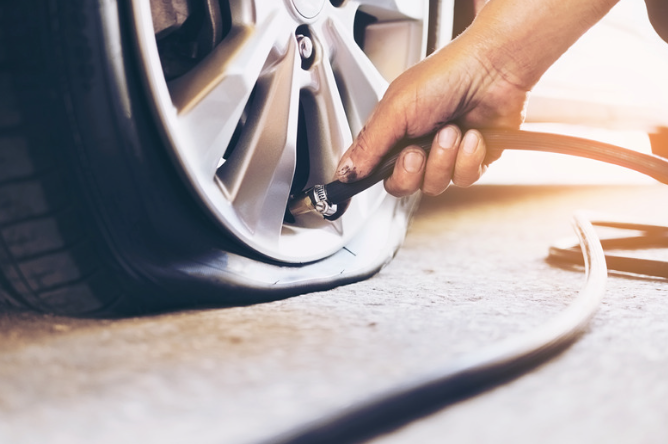
A Guide for Volkswagen Drivers
As a Volkswagen vehicle owner, you cherish the freedom and exhilaration that comes with driving your vehicle.
Whether you are navigating busy city streets or setting out on a weekend trip, your Volkswagen vehicle is your trusted companion on the road.
However, no matter how reliable your vehicle may be, encountering a flat tire can quickly change your plans for the worse.
Understanding the various factors that can lead to a flat tire is essential for staying prepared and ensuring a smooth driving experience.
In this guide, we will take a close look at the most common causes of flat tires and provide valuable tips and insights to help Volkswagen drivers minimize the risk of encountering this inconvenience.
Puncture from Road Debris
One of the most prevalent causes of flat tires is punctures from road debris.
Every day, vehicles encounter a myriad of hazards on the road, including nails, screws, glass shards, and sharp rocks.
When your tires come into contact with these objects, they can penetrate the rubber surface, causing air to leak out.
Even seemingly innocuous debris can wreak havoc on your tires if it finds its way into the tread.
To mitigate the risk of punctures, it is essential to remain vigilant while driving and avoid debris whenever possible. Additionally, conduct regular tire inspections to identify and remove any foreign objects lodged in the tread.
Another essential is to perform a quick inspection of your driveway or parking space before you drive out. Even in the span of a few hours, debris from things like littering can put your tires at hazard.
Underinflation
Maintaining proper tire pressure is crucial for ensuring optimal performance, fuel efficiency, and safety.
When your tires are underinflated, they become more susceptible to damage from impacts and overheating. These all can increase the likelihood of a flat tire.
Underinflation can also lead to uneven wear and reduced traction, compromising your vehicle’s handling and stability.
To prevent underinflation, it is essential to check your tire pressure regularly using a reliable gauge and inflate them to the manufacturer’s recommended PSI (pounds per square inch).
Volkswagen vehicles often come equipped with a Tire Pressure Monitoring System (TPMS) that alerts you when tire pressure is low, but manual checks are still recommended.
Overinflation
While underinflated tires pose significant risks, overinflation can also contribute to flat tires and other tire-related issues.
Excessive air pressure causes the tire to become rigid and less flexible. This makes a tire more susceptible to punctures and blowouts, especially when encountering obstacles on the road.
Potential overinflation issues make it crucial to adhere to the recommended tire pressure guidelines provided in your Volkswagen owner’s manual and adjust accordingly based on driving conditions and load.
Damaged Valve Stem
The valve stem plays a crucial role in maintaining proper tire pressure by allowing air to enter and exit the tire.
If the valve stem becomes damaged or deteriorates over time, it can result in air leakage and eventual flat tires.
Common causes of valve stem damage include wear and tear, corrosion, and impact from curbs or debris.
Regular inspection of a valve stem is essential to identify any signs of damage, such as cracks or leaks, and address them promptly.
Additionally, installing valve stem caps can help prevent dirt and moisture from compromising the integrity of the valve stem.
Tire Age and Wear
Like all automotive components, tires have a finite lifespan and undergo wear and tear over time. As tires age, the rubber compound deteriorates, becoming less flexible and more prone to cracks, punctures, and blowouts.
Additionally, worn tread depth reduces traction and increases the risk of hydroplaning in wet conditions, compromising your vehicle’s safety.
To ensure optimal tire performance and longevity, it’s crucial to monitor your tires’ age and mileage and replace them as needed.
Regular tire rotations and inspections can also help identify signs of wear and address issues before they escalate.
Driving on Rough Terrain
While Volkswagen vehicles are renowned for their versatility and performance, driving on rough terrain or uneven surfaces can expose your tires to increased wear and tear.
Off-road adventures, construction zones, and poorly maintained roads pose significant challenges to your tires, including the risk of punctures, cuts, and sidewall damage.
To minimize the risk of flat tires when driving off-road or on rough terrain, consider investing in rugged tires specifically designed for such conditions. Additionally, exercise caution and reduce speed to minimize the impact on your tires and vehicle suspension.
Faulty Wheel Alignment
Proper wheel alignment is essential for ensuring that your tires make consistent contact with the road surface, promoting even wear and optimal handling.
However, misaligned wheels can lead to uneven tire wear, premature tire failure, and an increased risk of flat tires.
Common causes of wheel misalignment include hitting potholes, curbs, or other road hazards, as well as normal wear and tear over time. It’s essential to schedule regular wheel alignments as part of your vehicle maintenance routine, especially after encountering road hazards or experiencing changes in vehicle handling.
Tire Treatment from Neil Huffman Volkswagen
Encountering a flat tire can be a frustrating experience, but with the right knowledge and preventive measures, Volkswagen drivers can minimize the risk and enjoy a smoother driving experience.
By staying vigilant, maintaining proper tire care, and addressing issues promptly, you can reduce the likelihood of unexpected flat tires and ensure that your journeys are safe and enjoyable.
Remember to regularly inspect your tires for signs of damage, maintain proper tire pressure, and seek professional assistance from Neil Huffman Volkswagen if needed. With our proper care and attention, your Volkswagen vehicle will continue to provide reliable performance mile after mile.




